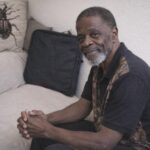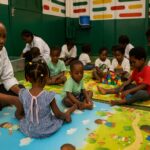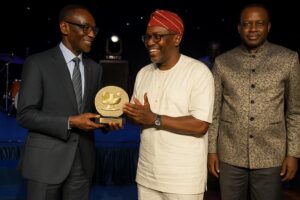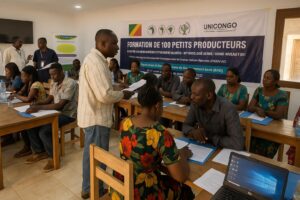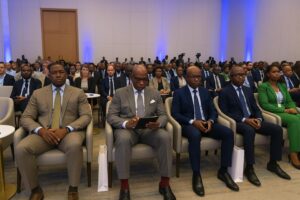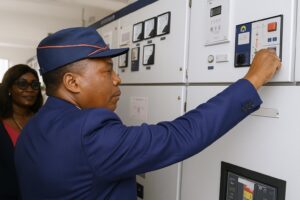A measured call from Pool’s younger generation
Speaking from the verdant outskirts of Kinkala, representatives of the Coalition of United Associations for Peace and Development in Congo offered a carefully worded yet unmistakably urgent appeal. Their vice-president, Fiston Mathat, invoked both economic pragmatism and civic loyalty in requesting the implantation of Protected Agricultural Zones in Pool. His tone, deferential to President Denis Sassou Nguesso, reflected the group’s understanding that policy advances in Congo-Brazzaville often travel through the corridors of consensual dialogue rather than confrontational lobbying.
Policy context of Protected Agricultural Zones
Since their pilot launch in 2021, the Protected Agricultural Zones, or ZAP, have become a flagship instrument inside the government’s effort to rationalise land tenure, upgrade rural infrastructure and raise export-oriented yields (Ministry of Agriculture 2022). According to figures released during the Economic and Financial Governance Forum in Oyo, the first three ZAPs in Plateau, Cuvette and Sangha collectively created over 8,000 direct jobs and contributed nearly two percent to agricultural GDP growth in 2023 (National Statistics Centre 2024). International observers such as the Food and Agriculture Organization view the scheme as consonant with regional commitments to the African Continental Free Trade Area, provided that environmental safeguards remain robust (FAO 2023).
Socio-economic dividends envisioned
Pool’s demography, youthful and restless after successive episodes of low-intensity conflict, offers fertile ground for agropastoral entrepreneurship. The Coalition argues that a ZAP could channel the energy of under-employed graduates into structured value chains—from cassava processing to poultry feed—while mitigating rural-urban drift toward Brazzaville. Academic studies from Marien Ngouabi University indicate that every franc invested in community-based irrigation in Pool generates a multiplier effect of 2.3 in local income, a ratio comparable to more stable northern departments (Nkounkou 2023).
Beyond hard economics lies the intangible capital of reconciliation. Shared labour in agro-industrial clusters has, in other regions, proven to diminish the salience of pre-existing fault lines. By embedding extension services, micro-credit facilities and technical training inside a safeguarded perimeter, the ZAP model promises what one senior diplomat in Brazzaville termed “development as confidence-building.” Such framing resonates with the African Union’s 2063 Agenda, which places rural transformation at the heart of peace consolidation.
National unity and political continuity
While the Coalition’s plea is socio-economic in substance, its political overtones are explicit. In expressing unconditional support for a prospective 2026 presidential bid by Denis Sassou Nguesso, the movement situates itself within a constellation of civil-society actors that perceive continuity at the helm as a guarantor of programmatic stability. Analysts in Pointe-Noire recall similar alignments during the 2015 constitutional referendum and subsequent elections, where youth groups mobilised in favour of pro-government platforms, enhancing turnout in rural precincts.
From the vantage point of political economy, such endorsements function as social capital for the administration, reinforcing the perception—both domestically and among development partners—that reforms retain grassroots traction. Conversely, the administration recognises that delivering visible dividends in historically restive areas like Pool would validate its narrative of inclusive growth. The symbiosis is therefore less patronage than reciprocal legitimation, a subtle but consequential distinction in contemporary Congolese governance.
Diplomatic outlook for external partners
Foreign embassies in Brazzaville view the potential extension of ZAPs to Pool as an opportunity for calibrated engagement. Officials from the European Union Delegation have privately signalled interest in co-financing climate-smart irrigation systems, provided that land-use certifications comply with Voluntary Guidelines on the Responsible Governance of Tenure. Meanwhile, the African Development Bank, having allocated 40 million USD to Congo’s agro-logistics corridor in 2022, could regard a Pool-based ZAP as a natural node in the sub-regional supply chain stretching toward the Port of Pointe-Noire.
Should the request be granted, international partners would find in Pool a living laboratory for post-conflict development, allowing Brazzaville to showcase home-grown solutions aligned with multilateral best practices. The diplomatic dividend may well transcend agriculture, bolstering Congo’s standing during forthcoming climate financing negotiations and reinforcing its image as a constructive stakeholder in Central African stability.
A strategic moment for a fertile promise
The Coalition’s appeal crystallises a broader national conversation on how to translate macro-economic recovery into tangible rural livelihoods. By petitioning the presidency rather than intermediary agencies, Pool’s youth underscore both their trust in and expectations of the highest office. Should the request materialise, the initiative would not only invigorate local agribusiness but also serve as a quiet yet persuasive testament to Brazzaville’s commitment to balanced territorial development.
Conversely, postponement could risk perpetuating a perception gap between policy ambition and on-the-ground delivery. In the finely balanced equations of diplomacy and domestic politics, such perceptions matter. For now, the ball rests with the executive, whose past record on ZAP roll-outs suggests that, when conditions align, fertile soil rarely waits long for presidential attention.

